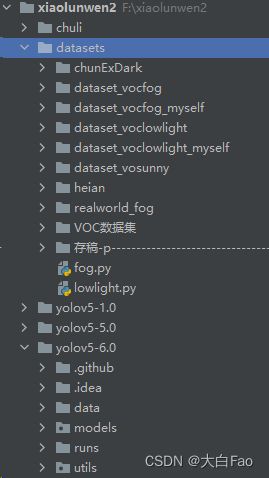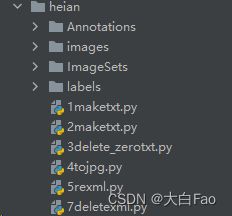YOLOv5 数据集划分及生成labels
0.本人文件夹存放格式
(因为要测试多个数据集和不同的yolov5版本和其他算法,所以数据集整体放到外面)
1.划分数据集 验证集 测试集
# -*- coding:utf-8 -*
import os
import random
val_percent = 0.2
test_percent = 0.2
train_percent = 0.8
xmlfilepath = 'Annotations'
txtsavepath = 'Images'
total_xml = os.listdir(xmlfilepath)
num = len(total_xml) #统计所有的标注文件
list = range(num)
tr = int(num * train_percent ) # 设置训练和验证集的数目
tv = int(num * train_percent * val_percent) # 设置训练集的数目
te = int(num * test_percent)
trainval = random.sample(list, tr)
val = random.sample(trainval, tv)
# txt 文件写入的只是xml 文件的文件名(数字),没有后缀,如下图。
ftrainval = open('ImageSets\\trainval.txt', 'w')
ftest = open('ImageSets\\test.txt', 'w')
ftrain = open('ImageSets\\train.txt', 'w')
fval = open('ImageSets\\val.txt', 'w')
for i in list:
print(i)
name = total_xml[i][:-4] + '\n'
if i in trainval:
print(i)
ftrainval.write(name)
if i in val:
fval.write(name)
else:
ftrain.write(name)
else:
ftest.write(name)
ftrainval.close()
ftrain.close()
fval.close()
ftest.close()
2.生成labels标签 同时也把图片归一化
# -*- coding:utf-8 -*
import xml.etree.ElementTree as ET
import pickle
import os
from os import listdir, getcwd
from os.path import join
sets = ['train', 'test', 'val']
classes = ['person', 'bicycle', 'car', 'motorbike', 'bus']
def convert(size, box):
dw = 1. / size[0]
dh = 1. / size[1]
x = (box[0] + box[1]) / 2.0
y = (box[2] + box[3]) / 2.0
w = box[1] - box[0]
h = box[3] - box[2]
x = x * dw
w = w * dw
y = y * dh
h = h * dh
return (x, y, w, h)
def convert_annotation(image_id):
in_file = open('Annotations/%s.xml' % (image_id))
out_file = open('labels/%s.txt' % (image_id), 'w')
tree = ET.parse(in_file)
root = tree.getroot()
size = root.find('size')
w = int(size.find('width').text)
h = int(size.find('height').text)
for obj in root.iter('object'):
difficult = obj.find('difficult').text
cls = obj.find('name').text
cls = cls.lower();
if cls == "people":
cls ="person"
elif cls == "table":
cls = "diningtable"
if cls not in classes or int(difficult) == 1:
continue
cls_id = classes.index(cls)
xmlbox = obj.find('bndbox')
b = (float(xmlbox.find('xmin').text), float(xmlbox.find('xmax').text), float(xmlbox.find('ymin').text),
float(xmlbox.find('ymax').text))
bb = convert((w, h), b)
out_file.write(str(cls_id) + " " + " ".join([str(a) for a in bb]) + '\n')
wd = getcwd()
print(wd)
for image_set in sets:
if not os.path.exists('labels/'):
os.makedirs('labels/')
image_ids = open(
'ImageSets/%s.txt' % (image_set)).read().strip().split()
list_file = open('%s.txt' % (image_set), 'w')
for image_id in image_ids:
list_file.write('F:\\xiaolunwen2\\datasets\\dataset_vosunny\\images\\%s.jpg\n' % (image_id))
convert_annotation(image_id)
print(image_id)
list_file.close()

